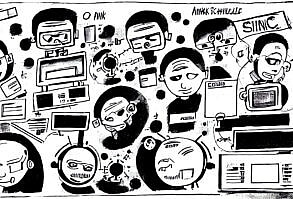Artificial Intelligence (AI) has been revolutionizing different fields, including healthcare. AI technologies are increasingly being used in mental health care, offering significant potential to improve the quality of care provided to patients. AI tools have been developed to identify and diagnose mental illnesses, track patient progress, and provide personalized treatment plans. However, the integration of AI into mental health care also presents some challenges and concerns. In this article, we will explore the impact of AI technology on mental health, including its benefits, drawbacks, and future prospects.
Advantages of AI in Mental Health Care
In this section, we will discuss the benefits of AI technology in mental health care. We will discuss the use of AI in the early detection of mental illnesses, identifying risk factors, and predicting potential relapses. The section will also cover the use of AI in developing personalized treatment plans based on the patient’s needs and preferences. Finally, the section will discuss the use of AI in improving access to mental health care services, especially in areas where mental health professionals are scarce.
Early Detection of Mental Illnesses
The early detection of mental illnesses is essential in preventing the progression of the illness and reducing the risk of long-term complications. AI tools can help identify signs of mental illness early on, allowing patients to receive early intervention and appropriate treatment. AI tools can analyze a patient’s behavior, language, and other factors to identify patterns that may indicate the onset of a mental illness.
Personalized Treatment Plans
AI technologies can help mental health professionals develop personalized treatment plans based on the patient’s unique needs and preferences. AI tools can analyze data on the patient’s medical history, symptoms, and lifestyle factors to create a personalized treatment plan that is tailored to the patient’s needs. This can lead to better treatment outcomes and improved patient satisfaction.
Improved Access to Mental Health Services
The shortage of mental health professionals in some areas can make it difficult for patients to receive timely and appropriate care. AI technologies can help fill this gap by providing remote mental health services. Patients can access mental health services through telehealth platforms that use AI tools to provide virtual consultations and treatment.
Drawbacks of AI in Mental Health Care
While AI technology has numerous benefits, it also presents some challenges and concerns. In this section, we will discuss some of the drawbacks of AI in mental health care, including concerns about patient privacy and data security, the potential for AI to perpetuate biases, and the limitations of AI tools in recognizing the complexity of human emotions.
Patient Privacy and Data Security
The use of AI in mental health care involves the collection and analysis of sensitive patient data, which raises concerns about patient privacy and data security. AI technologies must comply with regulations such as HIPAA, which sets standards for the protection of patients’ electronic health information.
Bias and Discrimination
AI technologies can perpetuate biases and discrimination, especially when they are based on biased data sets. AI tools may produce biased results that reflect underlying societal biases and reinforce existing inequalities in mental health care.
Limitations of AI Tools
AI tools have limitations in recognizing the complexity of human emotions and behaviors. Human emotions and behaviors are diverse and complex, and AI tools may not always be able to accurately interpret and respond to them.
Future Prospects
AI technology has the potential to revolutionize mental health care, but there is still much to be done to fully realize this potential. In this section, we will discuss some of the future prospects of AI in mental health care, including the development of more advanced AI tools that can better recognize and respond to human emotions and behaviors, the integration of AI into existing mental health care systems, and the potential for AI to improve the accuracy and efficiency of mental health diagnoses and treatments.
Advanced AI Tools
As AI technology continues to advance, more sophisticated AI tools are being developed that can better recognize and respond to human emotions and behaviors. For example, some AI tools are being developed to analyze facial expressions and body language to better understand a patient’s emotional state.
Integration into Existing Mental Health Care Systems
The integration of AI into existing mental health care systems can improve the efficiency and accuracy of mental health diagnoses and treatments. AI tools can help mental health professionals make more informed decisions by analyzing vast amounts of data and identifying patterns that may not be immediately visible.
Improved Diagnoses and Treatments
AI technology has the potential to improve the accuracy and efficiency of mental health diagnoses and treatments. For example, AI tools can help mental health professionals identify the most effective treatments for specific patients by analyzing data on treatment outcomes and patient responses.
Conclusion
AI technology has significant potential to improve mental health care by providing early detection, personalized treatment plans, and improved access to mental health services. However, there are also concerns about patient privacy and data security, the potential for AI to perpetuate biases, and the limitations of AI tools in recognizing the complexity of human emotions. It is crucial to continue exploring the benefits and challenges of AI in mental health care to ensure that AI technologies are used in a way that maximizes their potential to improve patient outcomes.
FAQs
- How can AI help with early detection of mental illnesses?
AI tools can analyze a patient’s behavior, language, and other factors to identify patterns that may indicate the onset of a mental illness.
- How can AI improve access to mental health services?
AI technologies can provide remote mental health services, allowing patients to access mental health services through telehealth platforms that use AI tools to provide virtual consultations and treatment.
- Are there any concerns about the use of AI in mental health care?
Yes, there are concerns about patient privacy and data security, the potential for AI to perpetuate biases, and the limitations of AI tools in recognizing the complexity of human emotions.
- Can AI tools accurately recognize and respond to human emotions and behaviors?
As AI technology continues to advance, more sophisticated AI tools are being developed that can better recognize and respond to human emotions and behaviors.
- How can AI improve the accuracy and efficiency of mental health diagnoses and treatments?
AI tools can help mental health professionals make more informed decisions by analyzing vast amounts of data and identifying patterns that may not be immediately visible, improving the accuracy and efficiency of mental health diagnoses and treatments.






